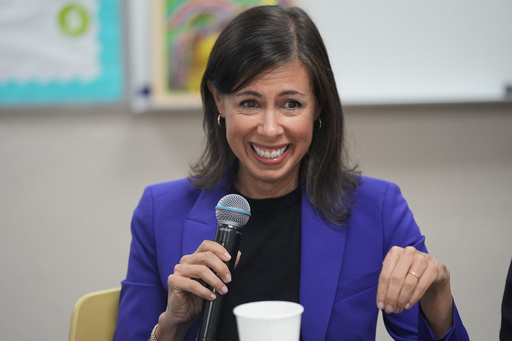
The Biden administration is taking steps to address the expiration of a broadband subsidy program that assisted over 23 million families in accessing the internet. The administration plans to use funds from the E-Rate program, designed to help schools and libraries provide WiFi hotspots, to alleviate the impact of the Affordable Connectivity Program’s termination.
Jessica Rosenworcel, chairwoman of the Federal Communications Commission, highlighted the urgency of the situation by emphasizing that many households are at risk of losing internet connectivity and stressed the importance of sustainability in bridging the digital divide. The Affordable Connectivity Program, which aimed to make internet access more affordable for low-income families, was not renewed by Congress, leading to its funding depletion earlier this year.
Rosenworcel met with mothers from Union Avenue Elementary School in Los Angeles, where the need for internet access was emphasized, especially for families facing financial constraints. The chairwoman expressed concern after hearing stories of families utilizing WiFi in public places for essential tasks like remote appointments, bill payments, and student homework.
The E-Rate program, established in the 1990s, has been vital in providing over $7 billion in discounts for schools and libraries to access broadband services. To further address the connectivity gaps, the program will be expanded to include WiFi hotspots, in addition to existing services like broadband products.
While the efforts to expand internet access have received support, there have also been criticisms. Some members of the FCC, particularly Republicans, have raised concerns that E-Rate should focus solely on supporting internet access within educational institutions, rather than extending services to homes or other locations.
Moreover, legal challenges have emerged regarding the funding mechanism of the E-Rate program and the Universal Service Fund, which supports various FCC-administered internet access initiatives. The recent ruling by the Fifth Circuit Court of Appeals labeling the funding mechanism as unlawful has introduced uncertainty about the future of these programs.
Despite these challenges, Chairwoman Rosenworcel remains optimistic about the potential of the Universal Service Fund to ensure equitable access to modern communications across the United States. She noted that the FCC is prepared to act swiftly if Congress decides to renew the Affordable Connectivity Program as a straightforward solution to address the pressing need for internet access among families.
